Bobi Wine: Uganda's 'ghetto president'
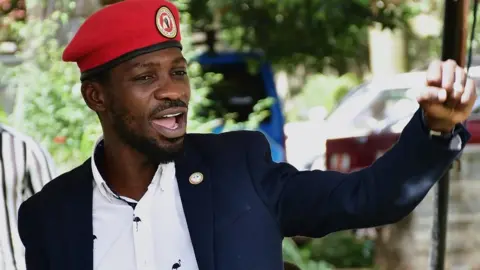 Reuters
ReutersThere has never been a peaceful handover of power in Uganda, but pop star-turned-politician Robert Kyagulanyi, popularly known as Bobi Wine, is hopeful it can still happen after failing to unseat long-serving President Yoweri Museveni in January's vote. BBC Africa correspondent Catherine Byaruhanga takes a look at the self-styled revolutionary.
"We are not broken," Bobi Wine declared to his party's newly elected members of parliament.
Visitors and the press were finally allowed into his home after the High Court ordered security forces to end an 11-day siege of his compound following January's presidential and parliamentary elections.
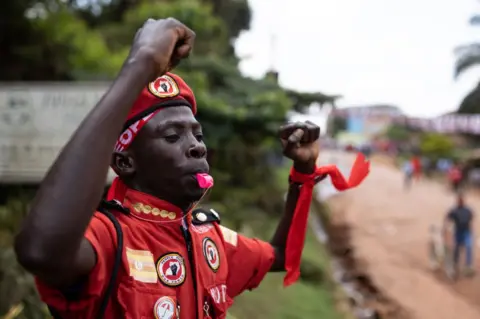 Getty Images
Getty ImagesThe two months of campaigning leading to the vote were some of the most violent Uganda has seen in decades.
Dozens were killed in protests and countless others detained across the country.
The toll it took on the 39-year-old politician seemed evident on his tired and often expressionless face.
Bobi Wine promised Ugandans a revolution in the run-up to the polls but once again President Museveni's control over the security forces and wide patronage network proved impossible to overcome.
The electoral commission declared the five-term president the winner with 58.6% of the vote compared to his young challenger's 34.8%.
Bobi Wine and his National Unity Platform (NUP) party rejected the results, citing evidence of rigging and voter intimidation.
But sat in front of the musician who calls himself the "ghetto president" was a new and powerful force of newly minted MPs and councillors, that take him from the periphery of Ugandan politics and much closer to the centre.
A few months after its formation, the NUP is now the biggest opposition party in parliament with 61 seats.
Even though that is much less than the ruling National Resistance Movement's 316 MPs, they will still play a key role in forming legislation and national debates.
Bobi Wine will not hold a formal national position, but he will influence this cohort.
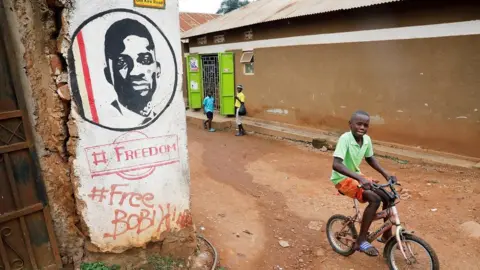 Reuters
ReutersAs he addressed the group in the garden of his home, he was at pains to remind them not to forget their "revolutionary" credentials.
"This is not the time to put on smart jackets and go to parliament and enjoy. Your constituents are watching," he warned.
Now that Bobi Wine and his party have inspired the youth the question is whether they can sustain the passion and eventually take power.
'He understands us'
Twenty-three-year-old law student Marion Kirabo is one of his supporters. She says he inspired her to run for a local council seat - though she lost.
"Even before his political life he was someone the youth could identify with," she says.
"Especially through his music, you could clearly see that he understood the social issues that young people were facing, especially young people from the ghetto."
When President Museveni came to power in 1986, Bobi Wine was just about to turn four, and living in Kanoni.

Central Uganda had been the battleground of the bush war that brought Mr Museveni's rebel National Resistance Army, and its political wing, the National Resistance Movement (NRM), to power.
Bobi Wine's grandfather, Yozefu Walakira, was part of a different rebel contingent but from time to time during the conflict hosted Mr Museveni in his house.
Walakira died during the civil war after being injured when his home was bombed - an attack which also killed three family members.
The musician's victories in the capital, Kampala, and central Uganda, also known as Buganda, were emphatic.
His party also took most of the parliamentary seats there, defeating several high-ranking ministers in the process.
It led the NRM to dub Bobi Wine a regional phenomenon and describe his support as ethnically-based - something he has rejected.

More about Uganda:

Bobi Wine spent much of his childhood in Kampala, his mother Margaret Nalunkuuma, a nurse, was the main breadwinner and bought land in the Kamwokya slum where the musician lived and built his now world-famous recording studio.
Some of his primary and secondary schools were within walking distance from Kamwokya.
As a teenager he discovered a passion for the arts, but when he first attended the prestigious Makerere University he started out studying for a social sciences degree. After one semester he switched courses and took on music, dance and drama, earning a diploma from the university in 2003.
'Campaigning all my career'
In 2017, the reggae star turned his hand to politics as he saw it as the logical next step.
"You know, all through my musical career, I've been singing about the challenges that… people go through," he told the BBC.
"So it's as if I've been campaigning, all my musical career."
His song Tuliyambala Engule (We Shall Wear the Victor's Crown) has become one of the campaign's unofficial anthems.
Allow Google YouTube content?

He won a by-election to become MP for Kyaddondo-East, a constituency to the north of the capital and even though an independent he aligned himself with the opposition. In a series of by-elections he campaigned for candidates who defeated hopefuls from the NRM.
There was a sound of regret in Bobi Wine's voice when he reflected on his rival's career in a BBC interview in 2019.
"Why did such a prized revolutionary decide to become one of the world's most despised dictators?" he asked.
"But it's also a lesson to many of us, knowing that we are saying what President Museveni was saying when he was in our times. And also to remember that it is only the idea of building strong institutions that can save us from ourselves."
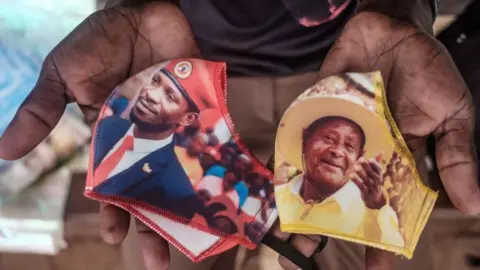 AFP
AFPThe comparisons between a younger Mr Museveni - charismatic, energetic and inspiring - with today's Bobi Wine are hard to escape.
The rebel commander was just 41 years old when he seized power, promising Ugandans security, a stronger economy and a better future.
Some do wonder whether his new challenger full of idealism and populist rhetoric might not make the same mistakes.
Activist Siperia Mollie Saasirabo, 24, who says she is now in "political exile" in Kenya, is disillusioned with Bobi Wine.
In 2019, she became the face of student protests over a fee hike at Makerere University. For that, she was abducted by people she believed were plain-clothed soldiers, badly beaten and left barely conscious.
'He lacks an ideology'
At the end of that year, she briefly joined Bobi Wine's party but left because of what she saw as a lack of ideological grounding.
"He was asked about his economic system when he is president," she says, referring to a July 2020 interview Bobi Wine gave to a local radio station.
"He was asked whether he was on the left or the right of the ideological setting, and his answer was he was neither on the right or the left and he will just use what works. It just does not make sense for me."
Francis Kibirige, national co-ordinator for the Afrobarometer survey in Uganda, has been carrying out opinion polls and studies in Uganda since 2000.
He says the question remains as to whether Bobi Wine has done enough to transcend opposition politics and chip away at the huge vote that President Museveni and the NRM have gained.
He argues that NRM supporters see the party and the president as "the guarantor of peace" and Bobi Wine's NUP has not done enough to persuade them otherwise.
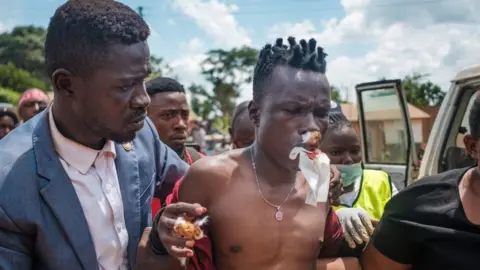 AFP
AFPAfter the vote the self-styled revolutionary finds himself in a difficult position.
He has to see how he take part in the country's decision-making and effectively oppose Mr Museveni's government.
There is also the question of whether he will be able to outmanoeuvre the incumbent by the next election.
His people-power struggle has come at a cost for those killed, injured and arrested. But Bobi Wine is not ready to give up just yet.
He told his new MPs: "This is no joking business, this is when the real fight begins. We are leading an entire generation out of slavery."
